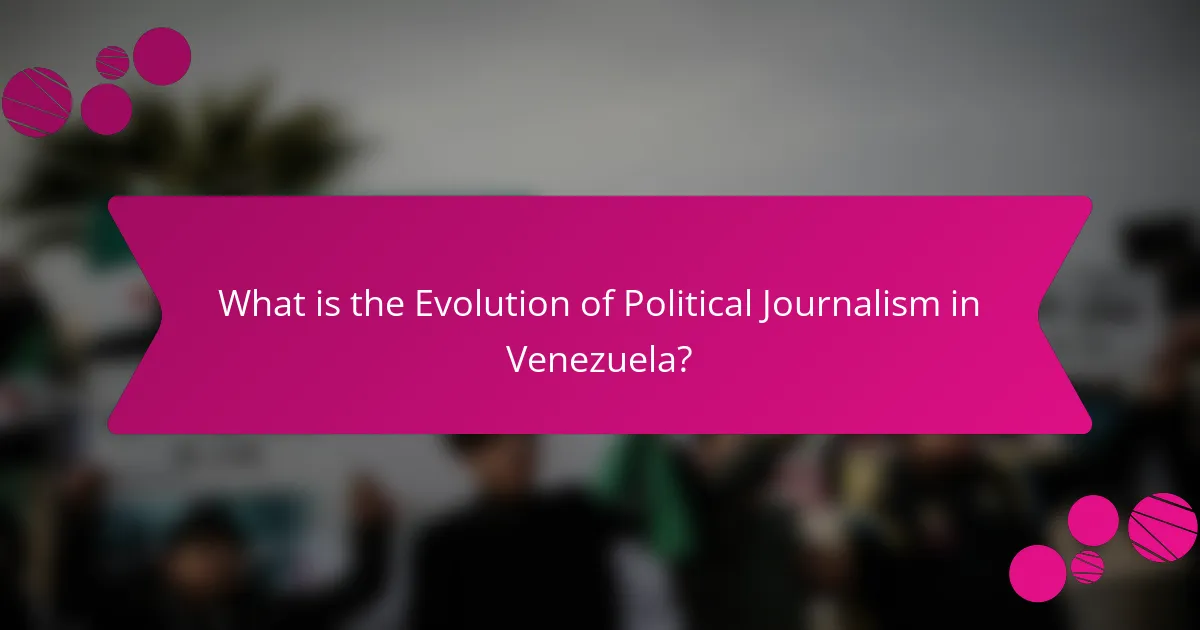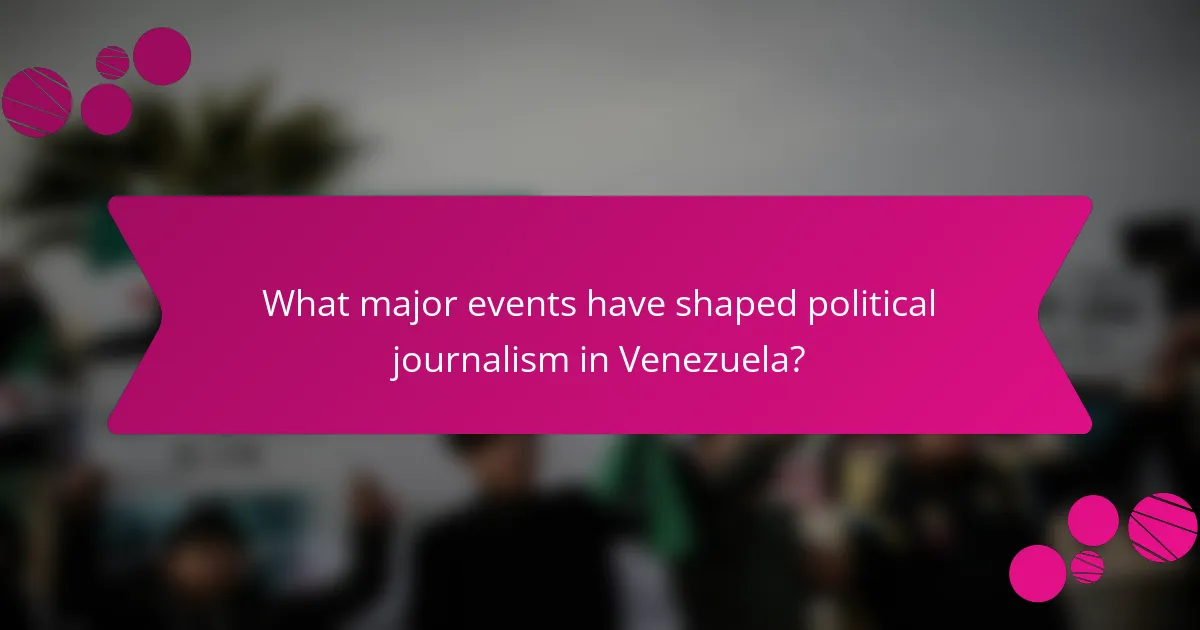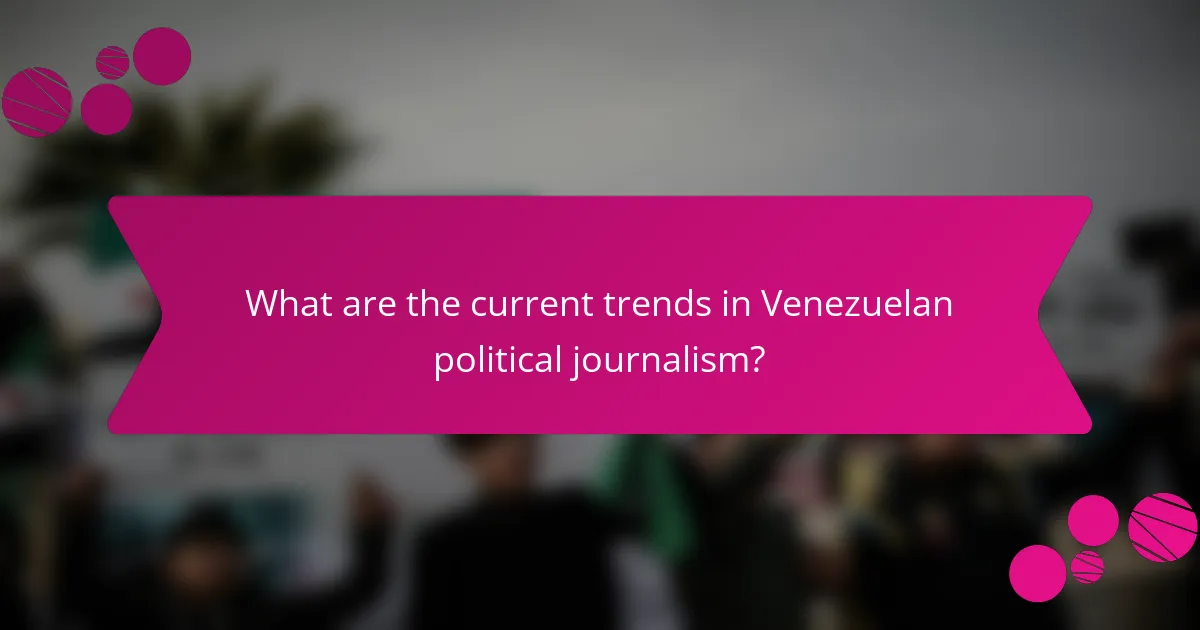
What is the Evolution of Political Journalism in Venezuela?
The evolution of political journalism in Venezuela has undergone significant changes over the decades. Initially, during the early 20th century, journalism was heavily influenced by political parties. The press served as a tool for political propaganda, often favoring government narratives.
In the 1958 democratic transition, political journalism began to diversify. New media outlets emerged, promoting investigative journalism and critical reporting. This period saw the rise of prominent newspapers and magazines that challenged government policies.
However, the late 1990s marked a turning point. With Hugo Chávez’s presidency, state control over media intensified. The government implemented laws that restricted press freedom. Journalists faced censorship and intimidation for reporting critically on the government.
In recent years, the political crisis has exacerbated challenges for journalism. Many journalists have fled the country due to threats and violence. Those remaining often work under precarious conditions, facing legal repercussions for their work.
Despite these challenges, digital journalism has gained traction. Social media platforms have become vital for disseminating news and mobilizing public opinion. Independent journalists continue to seek ways to report on political issues, often at great personal risk.
This evolution reflects the broader political landscape in Venezuela, where journalism plays a crucial role in shaping public discourse amid ongoing challenges.
How has political journalism developed in Venezuela over the years?
Political journalism in Venezuela has evolved significantly over the years, shaped by various political and social changes. Initially, during the 20th century, journalism thrived with a degree of freedom and a diversity of voices. However, the rise of Hugo Chávez in the late 1990s marked a turning point. Chávez’s government implemented laws that restricted media operations and targeted critical journalists. This led to a climate of fear and self-censorship among reporters.
In recent years, political journalism has faced even greater challenges. The government has intensified its crackdown on independent media, closing down outlets and detaining journalists. According to the Committee to Protect Journalists, Venezuela is one of the most dangerous countries for journalists. The economic crisis has also impacted media funding, forcing many outlets to shut down or rely on foreign support.
Despite these challenges, digital platforms have emerged as vital tools for political journalism. Social media allows journalists to reach audiences directly, bypassing state control. However, government surveillance and internet restrictions pose ongoing threats. Overall, political journalism in Venezuela has transitioned from a vibrant landscape to a battleground for freedom of expression.
What historical events have influenced the evolution of political journalism in Venezuela?
The evolution of political journalism in Venezuela has been significantly influenced by key historical events. The fall of the dictatorship of Marcos Pérez Jiménez in 1958 marked a turning point, leading to increased press freedom. The establishment of democracy allowed for diverse political expression in media. The 1998 election of Hugo Chávez introduced state control over media outlets, impacting journalistic independence. The 2002 coup attempt against Chávez further polarized media coverage, with journalists facing threats and censorship. The 2013 death of Chávez intensified government crackdowns on dissenting voices in journalism. The ongoing economic crisis has also led to the closure of many independent media outlets. These events collectively shaped the landscape of political journalism in Venezuela, highlighting the constant struggle for freedom of expression.
How have technological advancements impacted political journalism in the country?
Technological advancements have significantly transformed political journalism in Venezuela. The rise of the internet has facilitated rapid information dissemination. Social media platforms like Twitter and Facebook have become vital for journalists. They allow real-time updates and direct interaction with audiences. Mobile technology has enabled reporters to cover events live from the field. Digital tools have improved data analysis and fact-checking capabilities. Additionally, online news outlets have emerged, diversifying the media landscape. These changes have increased access to information, but also posed challenges like misinformation. Overall, technology has reshaped how political news is produced and consumed in Venezuela.
What are the key characteristics of political journalism in Venezuela?
Political journalism in Venezuela is characterized by government control, censorship, and a polarized media landscape. The government exerts significant influence over media outlets, often limiting freedom of expression. Censorship is prevalent, with many journalists facing threats or harassment. The media environment is highly polarized, reflecting deep political divisions in the country. Independent journalism struggles to survive due to economic constraints and legal challenges. Many journalists resort to self-censorship to avoid repercussions. Additionally, digital platforms are increasingly utilized to bypass traditional media restrictions. The rise of social media has created alternative channels for political discourse.
What role does political bias play in Venezuelan journalism?
Political bias significantly influences Venezuelan journalism. It shapes the narratives presented in the media. Journalists often align with political factions, impacting objectivity. The government exerts control over state media, promoting pro-government views. Independent media faces censorship and threats, leading to self-censorship. According to a 2021 report by the Committee to Protect Journalists, over 90% of Venezuelan journalists have faced pressure to alter their reporting. This environment fosters a polarized media landscape. The public often receives information filtered through political agendas. Consequently, trust in media has declined among citizens.
How do censorship and government influence shape the media landscape?
Censorship and government influence significantly shape the media landscape by controlling information dissemination. In Venezuela, the government has implemented strict regulations on media outlets. These regulations limit press freedom and restrict critical reporting. The government can shut down or censor media that opposes its agenda. For instance, the closure of critical television stations has led to reduced pluralism in news coverage. This creates a media environment dominated by state-sponsored narratives. Consequently, public access to diverse viewpoints is severely hindered. Research by the Committee to Protect Journalists indicates that Venezuela ranks among the most dangerous countries for journalists. Such conditions illustrate how censorship and government actions mold the media landscape, leading to a primarily state-controlled information flow.
Why is understanding the historical context of Venezuelan political journalism important?
Understanding the historical context of Venezuelan political journalism is crucial for comprehending its current dynamics. Historical context reveals how political shifts have shaped media freedom and journalistic practices. For instance, the rise of Hugo Chávez in 1999 marked a significant turning point. Chávez’s government implemented policies that directly impacted media operations, leading to censorship and the closure of critical outlets. This historical backdrop informs today’s challenges faced by journalists, including state control and violence against the press. Analyzing past events helps in recognizing patterns of government interaction with media. It also aids in understanding the role of journalism in promoting democracy and accountability in Venezuela. Therefore, knowledge of this context is essential for evaluating the state of political journalism today.
What lessons can be learned from the past regarding media freedom?
Media freedom has historically been influenced by political regimes. Authoritarian governments often suppress media to control public information. This suppression leads to a lack of transparency and accountability. In Venezuela, the decline of media freedom began in the late 1990s. The Chávez administration implemented laws restricting press freedom. Journalists faced intimidation and censorship during this period. The lessons learned highlight the importance of protecting independent journalism. A free press is crucial for democracy and informed citizenry. Historical examples demonstrate that media freedom fosters political accountability and social progress.
How does historical context inform current journalistic practices?
Historical context significantly informs current journalistic practices by shaping the ethical standards and reporting techniques used today. The legacy of censorship and state control in Venezuela has led to a heightened emphasis on investigative journalism. Journalists now prioritize transparency and accountability due to past government repression. The experiences of journalists during the 2002 coup attempt highlight the importance of timely and accurate reporting. Historical events have also fostered a culture of resilience among journalists, motivating them to resist oppressive regimes. Furthermore, the evolution of technology has transformed how news is disseminated, reflecting historical shifts in media consumption. Overall, the historical context serves as a foundation for the principles and practices that guide contemporary journalism in Venezuela.

What major events have shaped political journalism in Venezuela?
Major events that have shaped political journalism in Venezuela include the 1998 election of Hugo Chávez. This election marked a significant shift in media dynamics. Chávez’s government implemented policies that restricted press freedom. The 2002 attempted coup against Chávez further intensified media polarization. Following the coup, many journalists faced censorship and harassment. The 2007 closure of RCTV, a major television network, exemplified the government’s control over media. Additionally, the 2013 death of Chávez and the rise of Nicolás Maduro led to increased state propaganda. These events collectively transformed the landscape of political journalism in Venezuela.
How did the rise of Hugo Chávez affect political journalism?
The rise of Hugo Chávez significantly transformed political journalism in Venezuela. Chávez’s government implemented strict regulations on media outlets. These regulations often led to censorship and self-censorship among journalists. Chávez’s administration accused critical media of promoting misinformation. This created a hostile environment for independent journalism. The government also launched state-owned media to promote its agenda. This resulted in a polarized media landscape. Many journalists faced threats and violence for their reporting. The overall effect was a decline in press freedom and a shift towards propaganda.
What changes occurred in media regulation during Chávez’s presidency?
During Chávez’s presidency, significant changes in media regulation occurred. The government implemented laws that increased state control over media outlets. The Law on Social Responsibility in Radio and Television was enacted in 2004. This law imposed strict regulations on content, including penalties for broadcasting content deemed inappropriate. Chávez’s administration also established the National Telecommunications Commission to oversee compliance with these regulations. Many private media outlets faced pressure, leading to closures or changes in ownership. Critics argued that these changes stifled press freedom and limited dissenting voices. The government frequently accused media outlets of promoting misinformation. Overall, these regulatory changes marked a shift towards greater state influence in the media landscape.
How did Chávez’s policies impact journalistic integrity?
Chávez’s policies significantly undermined journalistic integrity in Venezuela. His administration implemented laws that restricted press freedom and increased government control over media outlets. The Law on Social Responsibility in Radio and Television, enacted in 2004, imposed heavy fines on media for broadcasting content deemed inappropriate. This law led to self-censorship among journalists, as they feared repercussions. Chávez’s government also targeted critical media by revoking licenses and shutting down outlets. This created an environment where dissenting voices were silenced. International organizations, such as Human Rights Watch, reported a decline in press freedom during his presidency. This combination of legal restrictions and direct government actions eroded the foundation of independent journalism in Venezuela.
What role did the 2014 protests play in the evolution of political journalism?
The 2014 protests significantly influenced the evolution of political journalism in Venezuela. These protests, driven by economic hardship and political repression, heightened public demand for independent news coverage. Journalists faced increased challenges, including censorship and violence, which led to a shift towards digital platforms for reporting. The rise of social media allowed for real-time updates and citizen journalism, circumventing traditional media restrictions. This period also saw a greater emphasis on investigative reporting to expose government actions. As a result, political journalism became more focused on accountability and transparency. The protests catalyzed a transformation in how news was reported and consumed in Venezuela.
How did media coverage of the protests influence public perception?
Media coverage of the protests significantly shaped public perception. It amplified voices of dissent and highlighted grievances against the government. Extensive reporting brought national and international attention to the events. This visibility influenced public opinion by framing the protests as legitimate expressions of discontent. Social media played a crucial role in disseminating images and narratives. The portrayal of protestors as brave and committed resonated with many citizens. Conversely, some media outlets emphasized violence, which led to mixed reactions. Overall, the media’s framing affected both support and opposition to the protests.
What challenges did journalists face during the protests?
Journalists faced significant challenges during the protests in Venezuela. They encountered violent repression from security forces. Many journalists were detained or assaulted while covering events. Access to information was restricted by government censorship. Journalists also faced difficulties in obtaining permits to report in certain areas. The hostile environment created a climate of fear, impacting their ability to report freely. Additionally, internet disruptions hindered communication and reporting efforts. These challenges highlight the risks involved in political journalism in Venezuela.
What are the implications of recent political changes on journalism?
Recent political changes in Venezuela have significantly impacted journalism. These changes have led to increased censorship and restrictions on media outlets. Journalists face threats and harassment for reporting on political issues. Many independent media have been forced to shut down or operate under severe limitations. The government controls major media channels, shaping public narratives. This environment has resulted in a decline in journalistic integrity and freedom. International organizations have reported on these violations, highlighting the risks faced by journalists in Venezuela. The overall trust in media has diminished as a result of these political shifts.
How has the current government approached media relations?
The current government has approached media relations with a focus on controlling narratives. It emphasizes state media while limiting independent journalism. This strategy includes censorship and harassment of dissenting outlets. Reports indicate a significant decline in press freedom under this administration. Organizations like Reporters Without Borders highlight Venezuela’s low ranking in global press freedom indices. The government often labels critical media as enemies of the state. This approach aims to consolidate power and reduce opposition visibility. Overall, the current media strategy reflects a broader trend of authoritarian control over information.
What are the emerging trends in Venezuelan political journalism today?
Emerging trends in Venezuelan political journalism include increased digital media usage, heightened investigative reporting, and a focus on citizen journalism. Digital platforms are becoming primary sources for news dissemination. Journalists are utilizing social media to reach wider audiences. Investigative journalism is gaining prominence due to the need for accountability. There is a rise in collaborative journalism among independent outlets. Citizen journalists are playing a crucial role in reporting on local issues. These trends reflect a response to governmental censorship and restrictions on traditional media. The shift towards digital and citizen journalism is essential for maintaining a free press in Venezuela.

What are the current trends in Venezuelan political journalism?
Current trends in Venezuelan political journalism include increased digital media use and a focus on investigative reporting. Journalists are leveraging social media platforms for real-time news dissemination. Many outlets emphasize transparency and accountability in governance. There is a growing trend of collaboration among independent journalists to share resources and information. Challenges such as censorship and government repression persist, influencing reporting styles. Additionally, there is a rise in citizen journalism as the public seeks to fill gaps left by traditional media. These trends reflect a resilient effort to inform the populace despite adverse conditions.
How is digital media transforming political journalism in Venezuela?
Digital media is significantly transforming political journalism in Venezuela by enhancing access to information and enabling real-time reporting. Traditional media faces severe restrictions under government control. Digital platforms provide alternative channels for journalists to disseminate news. Social media allows for immediate engagement with audiences. This shift has led to increased citizen participation in political discourse. According to a 2021 report by the Committee to Protect Journalists, over 70% of Venezuelans rely on social media for news. These platforms also facilitate the sharing of diverse perspectives often absent in state-run media. Consequently, digital media empowers independent journalism in a repressive environment.
What platforms are most influential in shaping public discourse?
Social media platforms are the most influential in shaping public discourse. They facilitate real-time communication and engagement among users. Platforms like Twitter, Facebook, and Instagram allow individuals to share opinions widely. These platforms have become critical for political movements and activism. For example, during the Venezuelan protests, social media was pivotal in mobilizing support and disseminating information. Research indicates that social media influences public opinion and political participation significantly. According to a 2020 study by the Pew Research Center, 69% of Americans use social media to engage with political content. Thus, social media platforms play a crucial role in the dynamics of public discourse.
How do social media dynamics affect traditional journalism?
Social media dynamics significantly impact traditional journalism by altering news dissemination and audience engagement. Social media platforms enable real-time sharing of news, which can outpace traditional news outlets. This speed often leads to a demand for quicker reporting, sometimes at the expense of accuracy. Additionally, social media allows for direct interaction between journalists and their audience, fostering a more participatory news environment.
In Venezuela, the rise of social media has provided alternative channels for information, especially in a context of governmental censorship. Research indicates that citizens increasingly rely on social media for news, affecting traditional media’s influence. A study by the Pew Research Center found that 62% of adults in Venezuela use social media as a primary news source. This shift challenges traditional journalism to adapt to new audience expectations and maintain credibility in a rapidly changing media landscape.
What challenges do journalists face in the current landscape?
Journalists in the current landscape face numerous challenges. These include government censorship, which restricts access to information. Economic instability affects funding for media outlets. Journalists also encounter threats to their safety, including harassment and violence. The rise of misinformation complicates the dissemination of accurate news. Additionally, the digital divide limits access to reliable technology and resources. The pressure for rapid reporting can compromise journalistic standards. Finally, audience fragmentation makes it difficult to reach diverse demographics effectively. These challenges hinder the ability of journalists to report freely and responsibly.
How does self-censorship manifest among Venezuelan journalists?
Self-censorship among Venezuelan journalists manifests through avoidance of sensitive topics. Journalists often refrain from reporting on government corruption and human rights violations. This behavior stems from fear of retaliation, including harassment and imprisonment. Many journalists choose to focus on less controversial stories to ensure their safety. The economic crisis further pressures journalists to self-censor due to job insecurity. According to a 2021 report by the Committee to Protect Journalists, 80% of Venezuelan journalists have experienced self-censorship. This trend reflects the oppressive media environment in Venezuela.
What risks do journalists encounter while reporting on political issues?
Journalists encounter various risks while reporting on political issues. These risks include physical threats, such as violence or imprisonment. In many countries, journalists face harassment from authorities or political groups. They may also experience censorship or restrictions on their reporting. Legal repercussions, including lawsuits or criminal charges, are common for journalists covering sensitive topics. Additionally, journalists often deal with the risk of misinformation and propaganda that can endanger their credibility. According to the Committee to Protect Journalists, over 1,300 journalists have been jailed worldwide, highlighting the severity of these risks.
What best practices can enhance the future of political journalism in Venezuela?
Enhancing the future of political journalism in Venezuela requires a commitment to transparency and accuracy. Journalists should prioritize fact-checking to combat misinformation. Training programs focused on ethical reporting can improve journalistic standards. Collaboration with international media organizations can provide support and resources. Utilizing digital platforms can increase reach and engagement with the audience. Establishing legal protections for journalists can safeguard against censorship and violence. Engaging with local communities can ensure diverse perspectives are represented. Lastly, promoting investigative journalism can uncover corruption and hold power accountable. These practices collectively strengthen the integrity and effectiveness of political journalism in Venezuela.
How can journalists promote transparency and accountability?
Journalists can promote transparency and accountability by investigating and reporting on government actions. They should fact-check statements made by public officials. This helps to hold leaders accountable for their promises. Journalists can also publish data and documents that reveal government operations. For instance, the release of the Panama Papers highlighted corruption among global leaders. Engaging with the public through social media can foster dialogue and increase accountability. Additionally, journalists can collaborate with watchdog organizations to amplify their impact. By adhering to ethical standards, they can build trust with their audience. Transparency in journalism itself, such as disclosing sources and funding, further enhances credibility.
What strategies can be employed to ensure media independence?
Establishing media independence requires several strategic approaches. First, securing diverse funding sources is essential. This can reduce reliance on government or corporate sponsorships that may influence content. Second, implementing strong editorial policies promotes journalistic integrity. These policies should prioritize transparency and accountability in reporting. Third, fostering a culture of investigative journalism can empower reporters to pursue stories without fear of repercussions. Fourth, building alliances with international media organizations can provide support and visibility. Finally, promoting media literacy among the public encourages critical consumption of news. These strategies collectively help safeguard media independence in challenging environments like Venezuela.
The main entity of the article is political journalism in Venezuela. The article explores the evolution of political journalism in Venezuela, detailing its historical context, major events, and current trends. It highlights the impact of key political shifts, particularly the rise of Hugo Chávez, on media freedom and journalistic integrity. The discussion includes the challenges faced by journalists, such as censorship and violence, as well as the emergence of digital platforms and citizen journalism as responses to these pressures. The article concludes with best practices for enhancing media independence and accountability in the current landscape.
